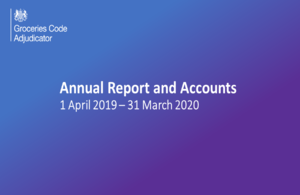Groceries sector more competitive after seven years of GCA
The Annual Report and Accounts for 2019/20 shows significant positives and progress for Christine Tacon after seven years as the Groceries Code Adjudicator.

A competitive groceries sector with stronger and more effective communication between retailers and their direct suppliers is the legacy of seven years of successful regulation, the outgoing Groceries Code Adjudicator says today.
In her end-of-term report Christine Tacon, the UK’s first GCA highlights the impact of her work and how the sector has changed since the Groceries Supply Code of Practice was introduced 10 years ago.
We have seen an increase, not a decrease, in competition in the sector as three more retailers have exceeded £1 billion turnover of groceries and been designated by the Competition and Markets Authority,” she says in the foreword to the 2019/2020 Annual Report and Accounts.
Furthermore, fresh produce suppliers have been growing in size and are confident under the protection of the Code to work closely and on longer contracts with retailers.
And there is stronger and more effective communication between retailers and suppliers; this is a significant change, the value of which has been apparent in the current Coronavirus crisis and the resultant need to maintain very efficient supply chains.
Suppliers feel more able to challenge the retailers to get the best joint solutions – no longer is the response “how high?” when the retailers ask them to jump.
Ms Tacon added:
I came into this role because I wanted to make a difference and I believe the evidence shows I have.
I will leave the GCA in the knowledge that by working with the sector, I have shifted the regulated retailers from practice-based compliance to enduring culture change, driving effective compliance risk management at all levels in every regulated business. This should ensure that breaches don’t happen and that if they do, they are quickly picked up and put right.
The Annual Report and Accounts for 2019/20 is Ms Tacon’s final report as GCA as she announced a year ago she would step down after her second term in office ends in June. However she is staying on for a short period to provide continuity and consistency in dealing with issues that may arise from changes to supply arrangements during the early stages of the COVID-19 emergency.
In the report the GCA points to other significant positives.
The original 10 regulated retailers are now exemplars among businesses for paying on time. The Duty to Report on Payment Practices and Performance results submitted to the Department for Business, Energy & Industrial Strategy cover all invoices, not just groceries, so are only a guide.
These 10 retailers notably paid between 93%-100% of all their invoices on time, whereas only 13% of all the suppliers to those retailers achieved the same level of prompt payment.
Working between retailers and suppliers has become more efficient. For example the business practices implemented in response to inconsistencies arising as a result of drop and drive have eliminated masses of paperwork as well as reducing time wasted on challenges.
Consumers have benefitted from an increase in innovative products on the supermarket shelves, created by a growing number of speciality suppliers which the retailers are welcoming to increase differentiation.
“I believe my success has come from the unique way I established of working with the retailers. I have taken a collaborative approach which should also be at the heart of healthy supplier-retailer relationships.
Over the past seven years I have had more than 300 meetings with retailers’ Code Compliance Officers to take up issues I was hearing from suppliers and ensure retailers were making progress in putting things right.
In her foreword to the Annual Report the GCA stresses that her collaborative approach is “not a soft touch” but one that enables tough, honest conversations and prompt remedial action and one which can be escalated to closer engagement to resolve issues or even to a formal investigation.
As well as her approach to regulation Ms Tacon identifies the GCA’s annual survey as another vital tool to secure progress, with the 2020 results telling a very positive story. She concludes:
I strongly believe that the Code, combined with the changes in culture and behaviour I have encouraged over the past seven years, provided the foundations for the excellent reaction of the groceries supply chain to the Coronavirus emergency.
The regulated groceries retailers and their suppliers overwhelmingly responded with the best interests of the consumer at the heart of everything they did and there has been a high level of communication between them throughout.
Notes to editors
-
The Government has recently announced that Christine Tacon will continue as GCA for a period of up to six months beyond her agreed contract specifically to deal with any issues arising from supply arrangements during the COVID-19 emergency.
-
The GCA published the results of the 2020 survey on 22 May 2020. Just 36% of suppliers responding reported having experienced a Code-related issue during the last 12 months, down from an initial 79% in 2014. Suppliers rated retailers’ behaviour at a record high with only three of the 13 regulated retailers scoring below 90% for Code compliance overall.
Groceries Code Adjudicator
7th Floor, The Cabot
25 Cabot Square
Canary Wharf
London
E14 4QZ
All information received will be treated in confidence. The GCA has a legal duty to preserve anonymity.